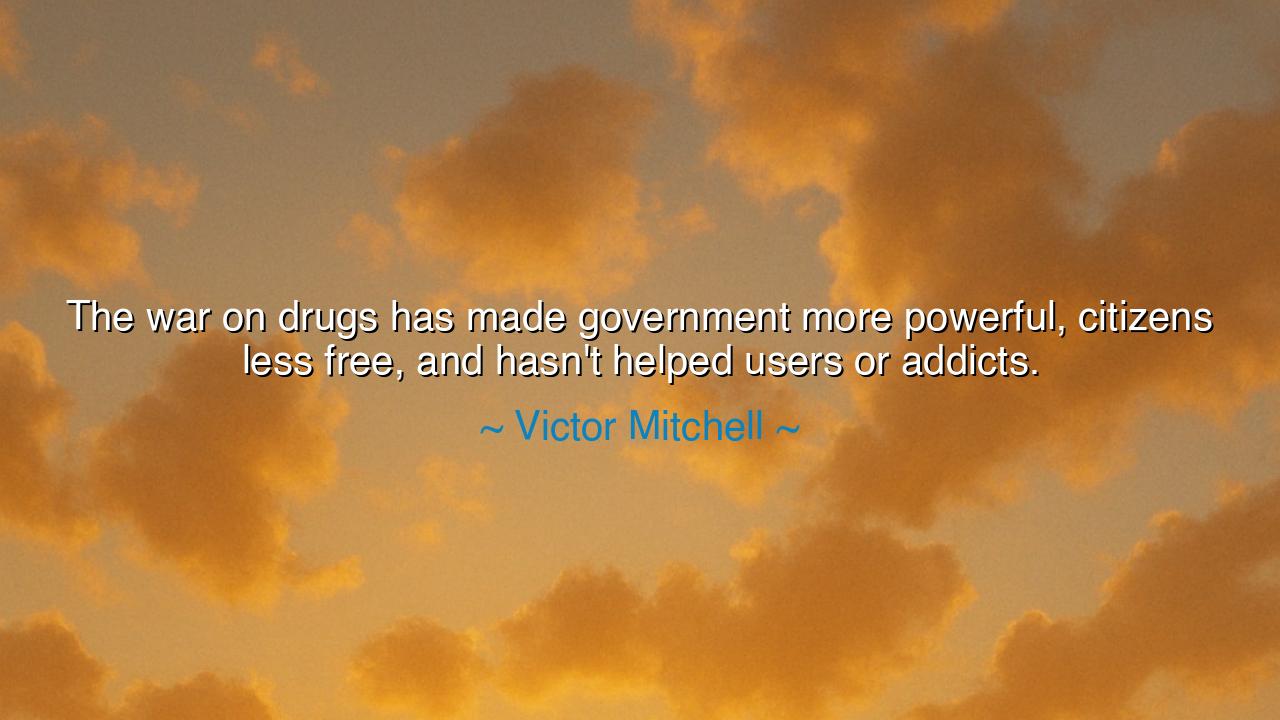
The war on drugs has made government more powerful, citizens less
The war on drugs has made government more powerful, citizens less free, and hasn't helped users or addicts.






"The war on drugs has made government more powerful, citizens less free, and hasn't helped users or addicts." — Victor Mitchell
Hear these words, O sons and daughters of freedom, and let their truth stir your hearts. Victor Mitchell, a voice from our own age, speaks with the clarity of one who has looked upon the failures of power and seen the suffering it leaves behind. When he declared, “The war on drugs has made government more powerful, citizens less free, and hasn't helped users or addicts,” he was not merely condemning a policy — he was unveiling a tragedy. His words echo the ancient wisdom that when rulers seek to conquer vice through force alone, they often end up conquering their own people instead. What began as a war against addiction became a war against liberty itself, where punishment replaced compassion, and fear replaced understanding.
The meaning of this quote is profound and sorrowful. Mitchell points to the truth that the so-called war on drugs, launched with righteous intent, has become a mechanism through which government power has expanded beyond its rightful bounds. In its name, surveillance has deepened, prisons have overflowed, and communities have been torn apart. The state, believing itself to be the savior of morality, has instead become the jailer of men. And yet, despite all the laws, all the raids, and all the billions spent, the addict — the very soul this war claimed to save — remains unhealed. In fighting the symptom, society forgot the human being.
The origin of this struggle lies in the twentieth century, when fear and politics entwined. In the 1970s, leaders across the world, and especially in the United States, declared a “war on drugs.” They promised to eradicate addiction, to cleanse society, to build a safer and purer world. But what followed was not salvation, but escalation. The prisons filled, not with kings of the drug trade, but with the poor, the desperate, and the young. Families were broken; trust in justice eroded. Laws meant to protect became tools of oppression. Instead of curing the disease, the state deepened the wound, for it fought with chains and guns what could only be healed with wisdom and compassion.
Consider, my friends, the story of Portugal — a nation that once walked the same dark path, consumed by addiction and crime. But in the year 2001, the Portuguese cast aside fear and chose courage. They ended their war against their own people. Instead of criminalizing addiction, they treated it as a matter of public health, offering care rather than condemnation. And behold — the prisons emptied, deaths from overdose plummeted, and the dignity of countless citizens was restored. This, then, is the living proof of Mitchell’s wisdom: that compassion achieves what punishment cannot, and that freedom, not fear, is the soil in which healing grows.
Mitchell’s words also hold a deeper warning. When he says the government grows more powerful, he reminds us that each law born from fear grants the state a weapon that can one day be turned against anyone. A war that begins with good intentions — to save lives — can easily become a war against liberty itself. In every age, tyrannies have risen not in the name of evil, but in the name of protection. The war on drugs, cloaked in virtue, has allowed governments to seize property without trial, to monitor citizens without cause, and to judge without mercy. Thus does freedom die — not with the roar of armies, but with the quiet passing of laws justified by fear.
But Mitchell’s wisdom is not merely a lament; it is a call to awakening. He asks us to look with compassion, not condemnation; to see addiction not as a crime, but as a cry for help. He calls upon citizens to reclaim their courage — to challenge systems that punish the weak while enriching the powerful. The true victory over addiction will not come from prisons, but from education, empathy, and understanding. A people cannot be free while they fear their own government, nor can a government be just while it wages war upon its own people.
So let us take from this the lesson of the ancients: that power without mercy corrupts, and law without love destroys. Do not allow fear to rule your conscience. Demand justice that heals, not vengeance that harms. See in every addict not a criminal, but a soul in need of light. For a society is not measured by the number it punishes, but by the number it redeems. When Mitchell said that the war on drugs has made citizens less free, he spoke not only of laws but of hearts — hearts hardened by judgment, eyes blinded by fear. Let us, then, be wiser than our age. Let us end wars that cannot be won and begin the work of understanding that can never be lost. For freedom is not the absence of laws, but the presence of compassion — and only through compassion shall a nation truly heal.






AAdministratorAdministrator
Welcome, honored guests. Please leave a comment, we will respond soon